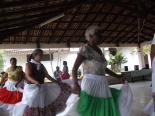God loves God’s people with the passion of a spouse for the beloved, and this IS a transforming love. The readings for today have many meanings but God’s transforming love is the common denominator. And how thankful I am for this transformation and its possibilities for everyone. If you recall the times of deep love in your life, especially when it was new, or newly reaffirmed and remember the many ways that your own most powerful love transformed you, you will have a sense of how God works in our lives. I remember being filled with joy and nearly dancing down the street. All of the common sights were made new and I noticed the beauty in everything. Every task was elevated to something important and done with greater care. My energy was uncharacteristically so heightened that people smiled and were lifted in our interactions. Nothing was ordinary, nothing was dull, and nothing was too hard or too simple to do. I was alive and the whole world was alive with me. I was on fire and setting the world around me on fire. The transformations of love, of being loved and of loving, of reciprocal love-what an untapped power!
Such transforming love is for lovers, for spouses, for parents of all types (biological, adoptive, foster and others), and it is for teachers and pastors, priests, and preachers and dear friends, it is for community workers of all sorts, including those whose love activates and animates a community. This may be a community of faith, or a community that stands together to make the changes for justice that must be made, even in adversity. This is the love that is prophetic, often charismatic, and strong enough to precipitate change. Dr. Martin Luther King, Jr., whose birthday is celebrated on January 18th and whose dream was to build the beloved community, was a prophet who was motivated and transformed by such love. The love of his “Precious Lord” motivated King (his favorite hymn was “Precious Lord, take my hand, Lead me on, let me stand….”). His experience of God’s love was transformed into his love for his African-American people and for all oppressed and poor people. It gave him the courage to inspire others, to lead a Movement and to die for the dream of justice and equality for all. In this he followed Jesus, the Precious Lord he loved.
Who or what do you call “precious” in your life? Partner, spouse, family, friends, co-workers, pets, neighbors, church members? Or is it the thingsyou love, house, car, jewelry, expensive electronic devices? What is precious to you can transform you-one way or the other.
The first reading is Isaiah 62:1-5 where God’s love for Jerusalem changes her name from “Forsaken” to “My Delight is in Her” and “Espoused”…. “Your land will be joined with God in wedlock” –“Your Builder will marry you”…. “As the newly married couple rejoice over each other, so will YHWH rejoice over you”. (Various translations, TIB, NIV, NAB, ICEL). Clearly, in any translation, God’s love transforms completely. When this love is reciprocal, we rejoice in God and God rejoices in us and we rejoice each other. God’s transformative love is the love of the Beloved Community, where justice and compassion are the order of the day. And we are empowered to be builders with God of this community.
To do this God gives us many varied gifts (I Corinthians 12: 4-11). God’s Spirit produces a wide variety of gifts and distributes them at will so that we can all help to build the Beloved Community with God. As the Psalm (96: 1-3: 7-10) says “Proclaim God’s marvelous deeds to all the nations.” The Beloved Community, based on Justice, is to be inclusive of all. And the song we sing must be a new song! (PS 96:1). I often hear our kids say: “That is the same old, same old”. And, no one is listening to “the same old, same old”. But, when we are full of the passion and fire of Love the song IS a new song. And we sing it with energy, joy and conviction. We are back to the wedding theme, praying that our love with God does not grow old and stale but is kept new, as new as a young couple rejoicing in one another, and like the new wine in the Gospel.
The Gospel for Sunday, 2nd Sunday in Ordinary Time, (John 2:1-11) is a segway from the special feast days of Christmas, Epiphany and the Baptism to the works of Jesus, the Christ, God’s Beloved, the Anointed One. Accounts of Jesus’ works are called Ordinary Time by the church, though what Jesus does and says is anything but ordinary. Jesus and his Mother Mary and probably his friends and other family members are at a wedding in Cana. It is a joyful time for the community. But the music will soon stop as the host has run out of wine. This is shameful for the host and will certainly disrupt the celebration. Mary brings this problem to her son, and she expects him to do something about it, instructing the stewards to do whatever he says to do. Jesus has not planned to start his ministry this way (John 2: 4), but he takes the opportunity to show God’s abundant love and, in a passage rich with symbolism, to let the community know that something new is about to happen. The six huge stone water purification jars are standing there in disuse, quite empty. If people wanted to fulfill washing rituals they would not have been able to do so. Jesus has these huge jars, each holding from 15 to 25 or 30 gallons, filled with water then turns it into wine. Probably a whole town could not consume so much wine-it is wine in great abundance. And it is described as “the best wine”, “the good wine”, “choice, wine” that has been “kept until now”.
Jesus moves the religious symbolism of the day from purification to abundant love, from a religion based on laws governing everything including when and how to wash to a religion based on God’s abundant love for all. The wedding is an apt metaphor for this, even as it was in Isaiah 62. On another level, Jesus is the new wine. He has faith that the new wine can be contained in the old vessels, but this is yet to be determined by the response of the people to the Way taught, lived and exemplified by Jesus. Jesus not only saves the host from shame but he brings life to the party. In the context of a wedding party, Jesus invites us to dance with the Beloved. Here’s to the dance! And, here’s to building the Beloved Community with the Beloved! Get on up now!
Rev. Dr. Judy Lee, RCWP
Co-Pastor Good Shepherd Inclusive Catholic Community






No comments:
Post a Comment